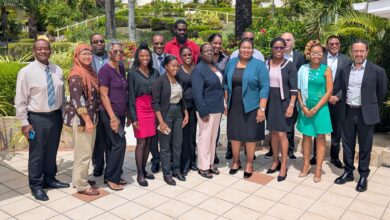The World Bank is actively working with ministries of education in dozens of countries in support of their efforts to utilize educational technologies of all sorts to provide remote learning opportunities for students while schools are closed as a result of the COVID-19 pandemic, and is in active dialogue with dozens more.
In support of this work, the World Bank is cataloguing emerging approaches, by country, in an internal database. In case related information may be useful to others, we are sharing excerpts from this database here.
BELIZE
As of the announcement on March 18th, 2020, all schools have been closed from March 20th for 2 weeks at the minimum.
The Primary School Examinations scheduled for March 30, 2020 and April 30, 2020 have been suspended. The regional body responsible for CSEC examination for high-school students and CAPE examinations for tertiary level students, namely the Caribbean Examinations Council (CXC), has put out an updated strategy to cope with school closures. This involves a modified examination process as follows. First, there will be administration of at least one common paper (Multiple Choice Assessments). Second, there will be School Based Assessments (SBAs) and an alternative to SBA for private candidates. Third, final grades will be awarded based on student performance on school based assessments and multiple choice assessments. e-Testing modality (online and offline) will be employed in order to reduce the examination administration processing time to enable quick turn-around time for marking and release of examination results. While the proposed revised administration schedule, previously for the May/June 2020 examinations, has now been updated to July 2020, the CXC will update this date based on guidance from the central government.
In light of region-wide disruptions of the academic term and examinations, CXC is well placed to facilitate continuous learning through the CXC e-Learning Hub. It provides learners and instructors with a single access point to multiple resources and a space for learners, educators, parents and employers to access multiple high-quality resources supporting teaching, learning and assessment. Resources cater to varying learning styles and students can explore written content as well as videos and slideshows. Resources include past papers, interactive syllabuses (including specimen papers and mark schemes), digital toolkits, subject reports and exemplar student responses. Through the CXC Learning Hub, teachers are able to create virtual classrooms where they can interact directly with students, in real time, incorporating content available on the CXC Learning Hub as well as their own content developed to support teaching and learning.
In addition, the Ministry of Education, Youth, Sports and Culture hosts detailed daily schedules and resources for students from preschool to grade 6 within language and mathematics. Each day’s schedule comes equipped with video lessons of teachers teaching along with lesson plans, questions for parents to ask children, worksheets, assignments, learning activities for younger students involving their family members, as well as further self-paced interactive videos for older students.
GUYANA
The Ministry of Education has put in place three key interventions to support the continuity of learning during COVID-19. First, practice test papers to support grade six students are available on the Ministry’s website for students in coastal and hinterland regions with Internet connectivity. Students without connectivity in the hinterland regions will benefit from the distribution of compiled worksheets. Second, students can tune into the television learning channel to access educational programs at designated times for students. Third, education lessons through interactive radio instruction (IRI) have been put in place for grades 1-3, and broadcast to schools catering to grades 3 -6 radio listeners.
The Ministry’s website offers digital resources for students categorized by grade and subject. It also provides teachers and parents with resources to navigate the school closure period.
JAMAICA
The Ministry of Education, Youth and Information has put in place support initiatives targeted at all levels of the education system to the end of April 2020, with the possibility of further extension if required. This support includes several services for students, including: printing service and printed learning kits for students without Internet connection; educational television lessons and rebroadcasts accessible on 25 cable channels (eg. “School’s not OUT” on TJ Live channel); zero-rated data access to the MoEYI website which houses educational content and online exam (PEP) workbooks; PEP hotlines; learning content composed by the Early Childhood Commission for children aged 0-5 years; school-based initiatives using Google Suite, Schoology, Edmodo, Zoom, Skype, WhatsApp, etc. are in place and supported by the Education Officers; partnerships with Internet service providers to enable online learning on subsidized data plans as well as zero-rated learning websites; subsidized data plans provided by Digicel that are benefiting teachers; and digital learning resources available on open online platforms (eg. One on One Educational Services, Cheetah, Book Fusion, Edufocal, the Learning Hub, CSEC COVID-19 Toolkit, etc.)
The National Parenting Support Commission (NPSC) has put in place several initiatives to support parents. First, parental advice on creating structure as well as safe and supportive learning spaces at home have been sent out to schools to be shared with parents. Second, psychosocial support helplines have been set up to support parents in an effort fuelled by public-private partnerships between VMBS Foundation, Fight for Peace and UNICEF. The NPSC will establish helplines in all churches for relevant localized support and response. The phones were purchased by VMBS Foundation. All volunteers are trained in psychosocial first aid by Fight for Peace. Third, successful negotiations with Digicel means free SIM cards are being made available for parents. UNICEF is paying for the calling credit and data for the phones. Fourth, five short videos have been launched on April 3, 2020, to support parents with home-schooling. Research shows that abuse of children escalates as their frustration levels increase when parents try to help with school work. NPSC developed these in partnership with renowned psychologists to ensure the scripts are based on research findings.
The Ministry is also actively seeking out feedback and acting on it rapidly to improve teaching and learning. For example, based on feedback from the regions, teachers at the early childhood to secondary levels are in need of training for developing and managing online learning environments. Thus, modules are being developed collaboratively (with eLJam, JTC, ECC, CSS, and NCEL) to support teachers and school leaders.
In an effort to support continued development, the National College for Educational Leadership, an initiative of the Ministry of Education, has created seven comprehensive short videos with tips for effective back-to-school planning and preparation. School leaders and administrators have been provided online training courses related to COVID-19 and leadership. These include curriculum implementation, vision setting, teacher leadership, emotional intelligence in leadership, and partnership and stakeholder engagement.
For more information see here: https://www.worldbank.org/en/topic/edutech/brief/how-countries-are-using-edtech-to-support-remote-learning-during-the-covid-19-pandemic






